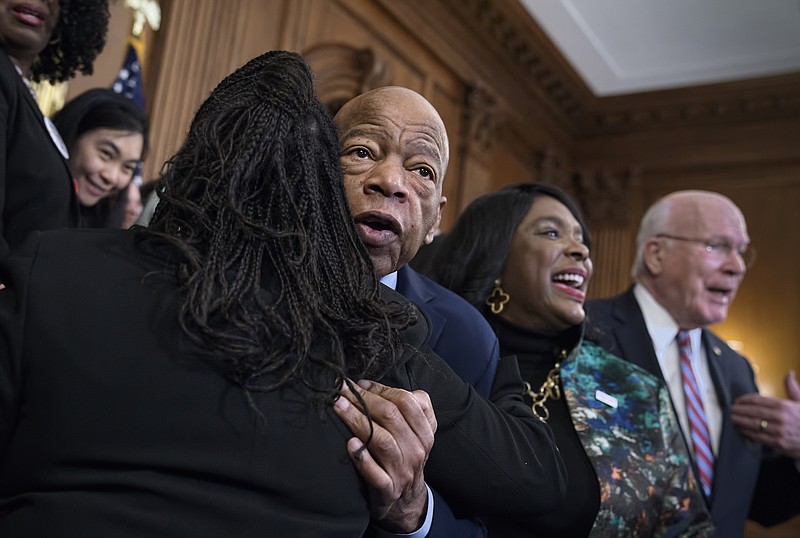Not all of Washington's icons are dead. Some are still living and walking among us.
That thought came to mind whenever I ran into Rep. John Lewis on Capitol Hill, or in other newsmaker hot spots.
In a place not known to be overflowing with moral authority, the Georgia Democrat, who died Friday at age 80, stood out.
Lewis' iconic presence instantly reminded me of his younger self, the 23-year-old Freedom Rider and student leader who warmed up the crowd in 1963, before Dr. Martin Luther King Jr. King delivered his historic "I Have a Dream" speech.
I would later learn that King and the movement's other elders had talked Lewis into toning down his speech. They feared his fiery talk (his original version called for a march "through the South, through the heart of Dixie, the way Sherman did") and critique of the initially weak civil rights bill that President John Kennedy's administration had proposed ("too little, too late," and "Which side is the federal government on?").
Lewis complied, just enough, and the crowd on the Washington Mall loved it anyway. "By the force of our demands, our determination and our numbers," he said, "we shall splinter the segregated South into a thousand pieces and put them together in the image of God and democracy. We must say: 'Wake up, America. Wake up!' For we cannot stop, and we will not and cannot be patient."
With other movement members, Lewis pushed Americans to live up to our best ideals of ourselves. He survived a brutal assault by Ku Klux Klansmen and more than 40 arrests at protests. In 1965, as he defiantly tried to cross the Edmund Pettus Bridge in Selma, Alabama, with fellow marchers for voting rights, a state trooper's billy club would fracture his skull.
Yes, he had a right to be angry and he was not alone. After the 1964 Civil Rights Act and the 1965 Voting Rights Act were passed, a newer and angrier "Black Power" movement broke out in 1966.
Over time, Lewis, who had been seen by many moderates as perhaps too "militant," gained a new reputation as a skilled peacemaker and unifier who could help fierce opponents find common ground.
He went to Congress, but he never fully left the streets. His last public appearance, appropriately enough, was with District of Columbia Mayor Muriel Bowser at the dedication of a "Black Lives Matter" mural on the 16th Street pavement that leads directly to the White House two blocks south.
As a memorial to how much his Black life mattered, a growing number of people have proposed renaming Selma's Edmund Pettus Bridge after Lewis.
But Black Democrats, including Sen. Kamala Harris of California and House Majority Whip James Clyburn of South Carolina, came out late Sunday with a better idea: Pass "the John R. Lewis Voting Rights Act of 2020."
In perhaps the biggest pushback to voting rights since Reconstruction, the Supreme Court in 2013 struck down a provision in the original 1965 law. That provision forced particular jurisdictions, mostly in the South, to report any changes in voting laws to the Justice Department for "preclearance" approval.
Lewis and others successfully passed a bill in the Democratic-controlled House last year that would've reinstated federal oversight of state election laws, but Majority Leader Mitch McConnell has not brought a similar bill to the Senate floor.
Allegations of voting discrimination through new state laws have gone up since the high court's decision, but the Department of Justice has done less to challenge those laws, according to the federal Commission on Civil Rights. There could hardly be a more fitting tribute to John Lewis' memory than to fix those enforcement shortfalls - fast!
The Chicago Tribune
